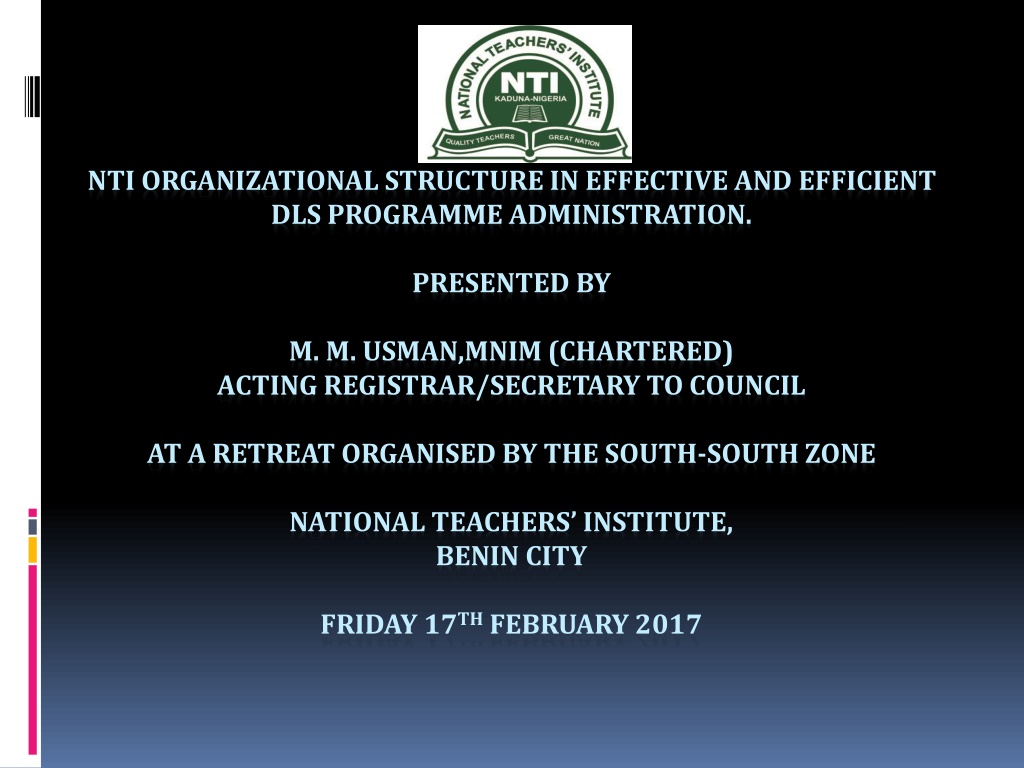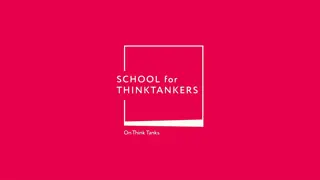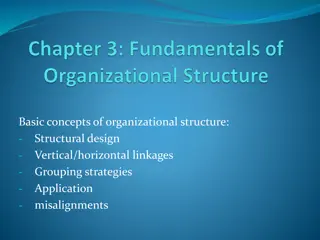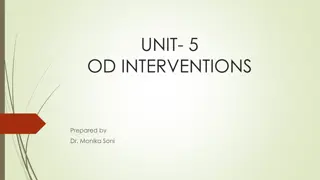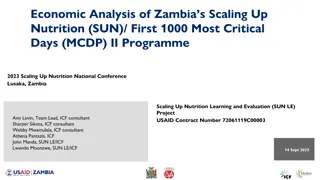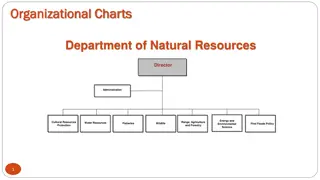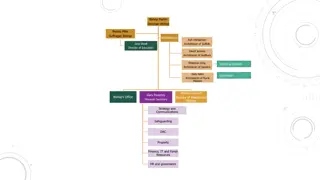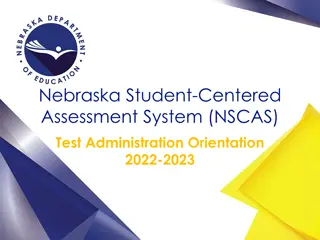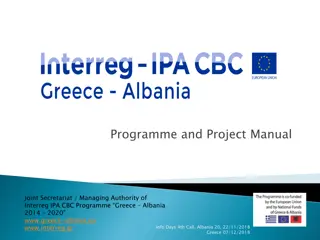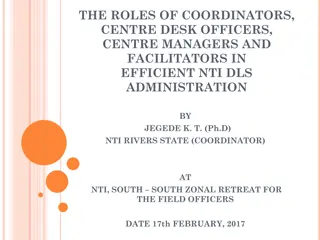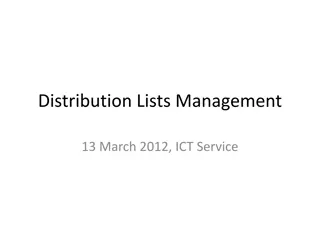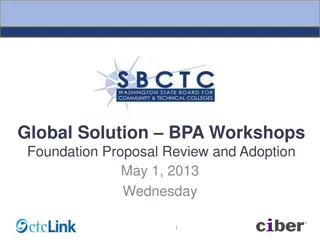Organizational Structure for Effective DLS Programme Administration by M. M. Usman
The National Teachers Institute (NTI) aims to address the shortage of teachers in Nigeria through distance education programmes. Established in 1976, the NTI offers various teacher training courses and functions to upgrade and improve the quality of education in the country. Through its network of zonal and state offices, the NTI serves serving teachers across the nation.
Download Presentation

Please find below an Image/Link to download the presentation.
The content on the website is provided AS IS for your information and personal use only. It may not be sold, licensed, or shared on other websites without obtaining consent from the author. Download presentation by click this link. If you encounter any issues during the download, it is possible that the publisher has removed the file from their server.
E N D
Presentation Transcript
NTI ORGANIZATIONAL STRUCTURE IN EFFECTIVE AND EFFICIENT DLS PROGRAMME ADMINISTRATION. PRESENTED BY M. M. USMAN,MNIM (CHARTERED) ACTING REGISTRAR/SECRETARY TO COUNCIL AT A RETREAT ORGANISED BY THE SOUTH-SOUTH ZONE NATIONAL TEACHERS INSTITUTE, BENIN CITY FRIDAY 17THFEBRUARY 2017
INTRODUCTION Education system the world over has witnessed tremendous structural changes and expansion. The role which education plays in national development is quite immense. The role has prompted successive governments in Nigeria since independence to accord it a high priority in national discourse. However, budgetary allocation, which is not commensurate with the demand for education, has caused manpower development, hence, the need for distanceeducation. severe setback in
INTRODUCTION cont. Adeyemi (2010), while cross-examining the issues affecting further development of education in the world today and Nigeria inclusive notes the followings: Private demand for all types of education has far exceeded the provision of education services in the country. The educational system has not succeeded in adjusting teaching/learning conditions to the fast changing social environment. In other words, there has been disequilibrium between the educational output and the nation s manpower needs. The gap between the supply of and demand for the financial resources required to sustain the educational system is becoming wider and deeper.
INTRODUCTION cont. The National Teachers Institute (NTI) provides instructional materials and interface mode distance education dedicated to the training, retraining and upgrading of teachers. It was established in 1976 as a strategic means of addressing the dearth of teachers for the Universal Primary Education (UPE) scheme. Since its inception, the Institute has mounted six distinct teacher training programmes through its Distance Learning System (DLS): The Teachers Grade II Certificate (TCII) 1982 to 2006 Nigeria Certificate in Education (NCE) 1990 to date Pivotal Teacher Training Programme (PTTP) 2000 to 2003 (afterwards mounted in states based on request) Special Teacher Upgrading Programme (STUP) 2007 to 2010. Postgraduate Diploma in Education (PGDE) 2005 to date Advanced Diploma in Education (ADE) 2005 to date Bachelors of Arts/Science Education Degree (BDPs) 2013 to date The Institute operates through a network of six Zonal(Regional) and 37 State offices (including FCT Abuja) with over 327 study centres, dispersed across the country. The trainees are mostly serving teachers.
FUNCTIONS OF THE NATIONAL TEACHERS INSTITUTE The Institute is mandated by its enabling law to: Upgrade under-qualified and untrained teachers. Provide refresher and other upgrading courses for teachers. Organize workshops, seminars and conferences, which would assist in the improvement of teachers. Conduct examinations. Carry out research in conjunction with other bodies on any matter relevant to the educational development in the country. Formulate policies and initiate programmes at all levels of education designed to improve by way of research the quality and content of education in Nigeria. Assess from time to time the training programmes offered by Institutions controlled by or associated with the Institute, with a view to ascertaining the professional competence of those Institutions. Offer such assistance, either alone or in co-operation with educational bodies as may be requested by the Institutions controlled by or associated with the Institute. Foster and enhance international co-operation in the education of teachers, and Perform such other functions as necessary or expedient for the full discharge of all the functions of the Institute under the Act.
FUNCTIONS OF THE NATIONAL TEACHERS INSTITUTE, CONT. Furthermore, in section 7(2), the Enabling Act states without prejudice to the generality of the provisions of the Act, the Institute s Governing Council shall have and exercise the following powers : To establish and maintain such schools, extra-moral departments and other teaching units within the Institute as the Council may from time to time decide. To provide such courses of instruction either alone or in association with such Universities and other Institutions whether in Nigeria or not, as the Council may determine, and to conduct examinations, and award such diplomas and certificates to those reaching a certain standard as a result of those examinations as may seem appropriate to the Council; To institute and award fellowships, medals, prizes and other titles; To mount exhibition and displays designed to foster an appreciation of trends in, and the scope of the requirement for education; To erect, provide, equip and maintain such educational, recreational and residential facilities as the Institute may require; To create lecturer ship and other academic posts and offices and to make appointments there to, and to encourage and make provision for research in the Institute.
ORGANIZATIONAL STRUCTURE Federal Ministry of Education Governing Council Director General & Chief Executive Officer Audit, Procurement, International Cooperation, Transparency SMASE National Centre Field Quality Assurance & ICT Academic Services Operations & Students Services Examinations Registry Bursary Field Operations Divisions(Zonal, State Offices & Study Centres) Students Services Division(Teachi ng Practice, Counselling/Mic ro Teaching & Students Project) Monitoring & Evaluation Division Human Resources Welfare & Pensions(Housi ng, Clinic, Model School) Council, Legal & Insurance Works, Transport & Ventures (NTI Conference Centre, Printing) Stores Academic Records Office Programme s Design & Development . Continuing Teacher Professional Development . Research and Development Standards Division Compliance & Servicom Division Learners Support Services (Teachers Radio, Educational Technology,Libr ary, E-Learning, MIS & NTI Portal) Test Treasury Operations Revenue, Budgeting Expenditure & Salaries Final Account Development Test Administrati on Computer Centre
Summary of the functions of the divisions in each of the departments Academic Services Department The Academic Services Department is responsible for all the academic programmes of the Institute. The department has the following divisions. Programmes Design & Development: The division designs and develops the six programmes currently in the Institute. The programmes are NCE, PTTP, PGDE, ADE and the BACHELORS DEGREE. Teacher Professional Development: as enunciated in the enabling Law of the Institute, continuing Teacher Professional Development is one of the cardinal functions of the Institute. To this end, this division conducts Capacity Building Workshops for Teachers from all States of the Federation and private concerns based on request. Research and Development: This division Co-ordinates research work on Teacher Education either being carried out alone in the Institute or in conjunction with other bodies some of the divisions functions are: Compilation, collation and analysis of data on the operations of the Institute. Publication of Research Reports and Institute s journals, Monographs, Newsletter and Annual Reports. Developing Blue prints for new programmes in the Institute.
Summary of the functions of the divisions in each of the departments Examinations Department The Examinations department has the following divisions namely: Test Development Division The Division is responsible for generation of test items (Examination questions). Test development involves item writing, editing and moderation. Workshops are organized to compile test items, using approved curricula and relevant table of specifications. The items are edited or vetted by a committee of subject specialists drawn from universities and COE s. The items are then moderated and stored in the item bank. Test Administration The Division is responsible for the conduct of all examinations also referred to, as test administration for all the Institute s programmes. Test Administration involves the following; Production of Marks and Attendance Sheets (M/A) Distribution of examination papers. The administration of the examinations at various centres, nationwide Computer Division Development of Software:- This involves the development of up to date software for the processing of examination results. Pre-printing of EMS forms. Computer entry and processing of examination scores:- The Computer Division is saddled with the responsibility of processing of the raw scores after the conduct of marking at marking centres. Data Entry Operators are used in the entry of scores and the scanners process and produce final results with grades. This is to facilitate the prompt processing and release of student s results
Summary of the functions of the divisions in each of the departments Field Operations and Students Services (FOSS) Department The duty of the Field Operations and Students Services Department is to ensure to the smooth operations of the programmes on the field. It has three divisions namely: The Field Operations Division This division oversees the administration of programmes in the Zonal, State and Study centres. This Division determines the success or failure of the programmes on the field. Student s Services Division: The student s services Division works in conjunction with the Zonal, state offices and study centres. It is saddled with the following responsibilities Collect and collate students records and data Distribution of course materials to Zonal and state offices for onward distribution to centres where students collect them at the point of registration. Provision of guidance and counselling services to students, at the centres nationwide. Monitoring and Evaluation Division: This division monitors and evaluates the running of the programmes in the study centres.
Summary of the functions of the divisions in each of the departments Field Operations and Students Services (FOSS) Department ZONAL OFFICES For administrative convenience and effective monitoring, six (6) Zonal Offices were established in the six geo-political zones in 2003 as follows: North-East Zone with headquarters in Bauchi. North-West Zone with headquarters in Kano. North-Central Zone with headquarters in Abuja. South-East Zone with headquarters in Enugu. South-West Zone with headquarters in Akure. South-South Zone with headquarters in Benin. Policies were passed through the Zonal Offices to the states for implementation, and for feedback mechanism. The Zones, thus, coordinate and harmonize the activities of the state offices in their zones and make reports to the headquarters from time to time. Zonal offices are headed by Zonal Coordinators who are senior Academic staff of the Institute. In all cases, Zonal Coordinators were at one time or the other State Coordinators and conversant with the programmes and operational activities of the Institute. The Zonal Coordinators were co-opted to be part of the expanded Management of the Institute so as to enhance policy formulation and implementation.
Summary of the functions of the divisions in each of the departments Field Operations and Students Services (FOSS) Department STATE OFFICES The Institute has offices in thirty six (36) states of the Federation and Federal Capital Territory (FCT Abuja) with acomplement of staff each, headed by a Coordinator who is a senior Academic staff of the Institute. Since the introduction of ICT in the Institute, Coordinators and their staff no longer register students manually. Student s registration are carried out on-line via the Internet. State offices assist in translating all policies of the Institute into reality. The Coordinators recommend for appointment as centre managers and course facilitators academic staff of Universities, Colleges of Education and polytechnics. These category of staff are on ad-hoc basis and conduct tutorials, supervise practical s, teaching practice and undertake monitoring of the conduct of tests, assignments and other curricular and extra-curricular activities in the centres.
Summary of the functions of the divisions in each of the departments Field Operations and Students Services (FOSS) Department STUDY CENTRES There are over 400 study centres located in private and public schools provided bythe Federal,State or Private Institutions across the country for all the programmes of the Institute. These centres are headed by Centre managers assisted by Centre Desk Officers. These centres are places where face to face tutorials (contacts) are conducted by the course facilitators for the students. Activities at the centres include discussions about students challenges/problems and progress and the conduct of tutorials and counselling. Functions of Coordinators (Zonal and States) Advertise the Programmes of the Institute Liaise and work with SOMEs, SUBEBs, LGEAs. Advertise the sales of application forms (prior to online applications, admissions and registration). Collect and remit fees to Headquarters/advise students on how to go about making payments through the Banks in compliance with the TSA policy of the Federal Government. Issue Admission letters (prior to online printing of admission letters). Ensure correct registration of students in programmes they are qualified for after confirming their full payments. Identify study centres/inspect proposed study centres and make recommendations to Headquarters through the Zonal offices. Identify facilitators and centre managers for all centres in the States Supervise the conduct of examinations and Teaching Practice. Prepare monthly, quarterly and annual reports for submission to Headquarters. Collaborate with Stakeholders and meet periodically to update them on the operations of the Institute. Serve as linkage between the Headquarters at Kaduna on one hand and the States and LGA on the other hand. Some of the functions have changed with the introduction of ICT (Application, Admission, and Registration taken over and of recent payment of fees through RRR or other means of payments).
Summary of the functions of the divisions in each of the departments Bursary Department Bursary Department The Bursary department is responsible for handling all financial transactions of the Institute. The Department has three divisions namely: Treasury Operations Division The functions of the division is as below: Payment of all claims (Both Staff and Contractors) Reconciliation of all Accounts of the Institute. Collection and payment of all taxes due for Government (PAYE, FIRS, VAT etc.) Revenue Budget Expenditure & Salaries Division Revenue Collection & Banking Payment of Staff Emolument (taken over by IPPIS) Posting of personnel cash book Preparation of Annual Budgets Preparation of sub-budgets Monitoring of the Implementation of Budgets Preparation of MTSS Budgets Final Account Division Checking & Control of all Cash books (Headquarters, Zones & States) Preparation of Quarterly Final Accounts of Zones & States. Preparation of Annual Final Accounts.
Summary of the functions of the divisions in each of the departments Registry Department The department is the fulcrum on which the Institute rotates has the responsibility of co-ordinating all the activities of the Institute. The Registry is essentially a service arm of the Institute. It renders secretarial services to the Governing Council, Management and Departments, Standing and Ad-hoc committees, towards the maintenance of extant rules and regulations and quality service delivery to the Institute stakeholders. The Registry Department has six (6) divisions as follows: a. Human Resource Division: Rules and Regulations Section Recruitment and Placement Induction, Training and Development Staff Audit and Deployment Staff Job Evaluation and Skill-Gap Analysis Open Registry Secret Registry
Summary of the functions of the divisions in each of the departments Registry Department Works, Transport& NTI Ventures Works and Transport Maintenance of houses and offices Rent of office space for Zonal and State offices Maintenance of vehicles at Headquarters, Zones and States NTI Conference Centre Printing press, Farms and, Landscaping Pensions& Welfare Division Processing of retirement benefits Staff welfare, Housing Estate, NTI Model School, NTI Clinic Issuance of certificate of service Handling all issues with PFAs and PENCOM Handling all deceased cases.
Summary of the functions of the divisions in each of the departments Registry Department Council, Legal & Insurance Matters Secretarial services to Council and Management Prosecuting cases in conjunction with External Solicitors and External bodies Render General Legal Services/Advice Stores Stock Valuation Inventory Checks Market Surveys Stocking and Storage of Items Issuance of items on request Academic Records Division The division in conjunction with the NTI Portal Managers handles all matters relating to applications, admissions, registration and students academic records at the Headquarters.The functions of the division are; Advertisements for new admissions Resolution of Complaints Processing of Academic Transcripts Update Students Records Verification and Authentication of Results Advertisement and Sales of Application Forms
Summary of the functions of the divisions in each of the departments Quality Assurance & ICT Department The department of Quality Assurance and ICT is broadly divided into three major divisions. These are: Standards Division, Servicom and Compliance Division, and Information and Communications Technology Division (ICT). Standards Division The Standard Division is saddled with the responsibility of ensuring that standards drawn for all programmes are set and met in the Institute s service delivery. The essence of Quality Assurance cannot be overemphasised in any organisation where visions and missions are set.The next most important thing is to put in place a mechanism that will ensure the attainment of the organizational goals and objectives; this is what is referred to as quality assurance or control. The function of this division in the Institute is to draw up instruments that will assess, collate, analyse and make recommendations for both policy making and or assess the effectiveness of the policy implementation, compliance and control. This division is to collate the action plans of all departments with a view to monitor and prepare reports for managements action. Servicom Compliance Division This division may also be termed as the Intelligence division of the Institute. The division verifies the quality of facilitators recruited, the quality of instructions being delivered. The frequency of supply and distribution of instructional materials and examinations and office management at Headquarters, Zonal, State and study centres. Ensure that the resolutions of facilitators and students complaints are in-line with extant rules and regulations. The division is to draw instruments to test compliance by the Headquarters, Zonal and State Offices with regards to the minimum standards of the Institute s accreditation and affiliation/regulatory bodies.
Summary of the functions of the divisions in each of the departments Quality Assurance & ICT Department Information and Communications Technology Division The third division of this department has to do with Information and Communications Technology (ICT) and the application of Educational Technology in the Institute s service delivery. this also include but not limited to the Management of the E-library, Management Information System (MIS), NTI Portal and the Teachers Radio whose programmes afford teachers and the communities to comprehend the best practices in terms of lesson presentations (activity based and student centred) or what could be termed as learning by doing, thereby taking learning to the door steps of the learners. The division is therefore entrusted with the functions of ensuring that enough and relevant ICT equipment are supplied to the Zonal, State offices and the study centres and are put to use for the effective and efficient training and self-development of teachers to advance the frontiers of learning in Nigeria. In the long run the division will also ensure that relevant instructional materials are uploaded for ease of access and use by students in learning and research. This will ultimately lessen the burden of production of hard copies of course materials which presently constitutes a huge drain on the Institutes finances. In summary, the functions of Quality Assurance and ICT department cut across all spheres of the Institute s service delivery so as to ensure standards, compliance and customer satisfaction.
Thank you for your attention. Mahmud M Usman
